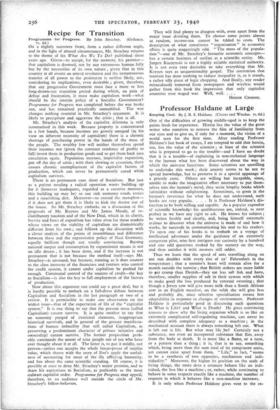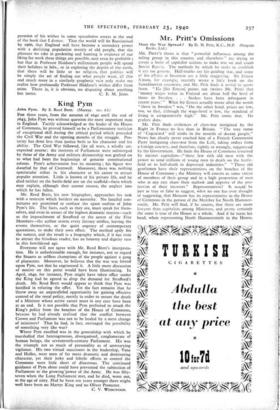Professor Haldane at Large
Keeping Cool. By J. B. S. Haldane. (Chatto and Windus. 7s. 6d.)
ONE of the difficulties of growing middle-aged is to keep the palate fresh for experience. Herein lies the value of the great writer who contrives to remove the film of familiarity from our eyes and to give us, if only for a moment, the vision of a world seen for the first time. After reading Professor Haldane's last book of essays, I am tempted to add that herein, too, lies the value of the scientist ; at least of the scientist who is prepared to go to the trouble—and I have no doubt that it is a trouble—of explaining in non-technical language to the layman what has been discovered about the way in which the universe functions. Some scientists are unwilling to undertake this work ; their anxiety seems to be not to spread knowledge, but to preserve it as a special appanage of a priestly caste. Others are willing but incapable, since, unable to make the imaginative effort necessary to put them- selves into the layman's mind, they write lengthy books which intimidate without enlightening. Sometimes, so great is the layman's reverence for what he does not understand, such books are very popular. . . . It is Professor Haldane's dis- tinction to be both willing and capable. As a popular expositor of scientific knowledge his qualifications are, indeed, as near perfect as we have any right to ask. He knows his subject ; he writes freshly and clearly, and, being himself extremely zealous to discover what the universe is made of and how it works, he succeeds in communicating his zeal to his readers. To open one of his books is to embark on a voyage of intellectual adventure under the guidance of an extremely competent pilot, who first intrigues our curiosity by a hundred and one odd questions evoked by the scenery on the way, and then satisfies it with answers still odder.
Thus we learn that the speed of ants travelling along an ant run doubles with every rise of ro° Fahrenheit in the temperature ; that a tortoise's heart will remain alive for a month outside the tortoise ; that British stokers are more liable to get cramp than Danish—they eat less salt fish and have, therefore, smaller supplies of salt in their system with which to make good the loss produced by external sweating ; that though a Jersey cow will give more milk than a South African cow in an English meadow, on the veldt she will give less and probably die, since selective specialisation means less adaptability in response to changes of environment. Professor Haldane is particularly good in discussing such questions as What is Life? and What is Death? He gives convincing reasons to show why the living organism which is so like an extremely complicated self-regulating machine, can never be described with complete adequacy as a machine ; in the mechanical account there is always something left out. What is left out is life. But what may life ,be? Certainly not a substance, not even an incorporeal substance that flies, away from the body at death. It is more like a flame, or a tune, or a pattern than a thing ; it is, that is to say, something which, being more than the sum total of its component units, yet cannot exist apart from them. " Life," in fact, " seems to be a synthesis of two opposites, mechanism and indi- viduality." Moreover, the higher its position on the scale of living things, the more does a creature behave like an indi- vidual, the less like a machine ; or, rather, while continuing to behave in some respects exactly like a machine, the number of respects in which it behaves like a non-machine increases.
It is only when Professor Haldane gives vent to the ex- pression of his wishes in some speculative essays at the end of the book that I demur. That the world will be Russianised by 1966, that England will have become a secondary power with a declining population mainly of old people, that the pleasure we take in gardening and hunting is evidence of our liking for work these things are possible, may even be probable ; but that in Professor Haldane's millennium people will spend their holidays in labs., or in exploring the depths of the earth, that there will be little or no religion, that politics will be simply the art of finding out what people want, all this and much more in a similarly prophetic vein only make me realise how profoundly Professor Haldane's wishes differ from mine. There is, it is obvious, no disputing about anything







































 Previous page
Previous page